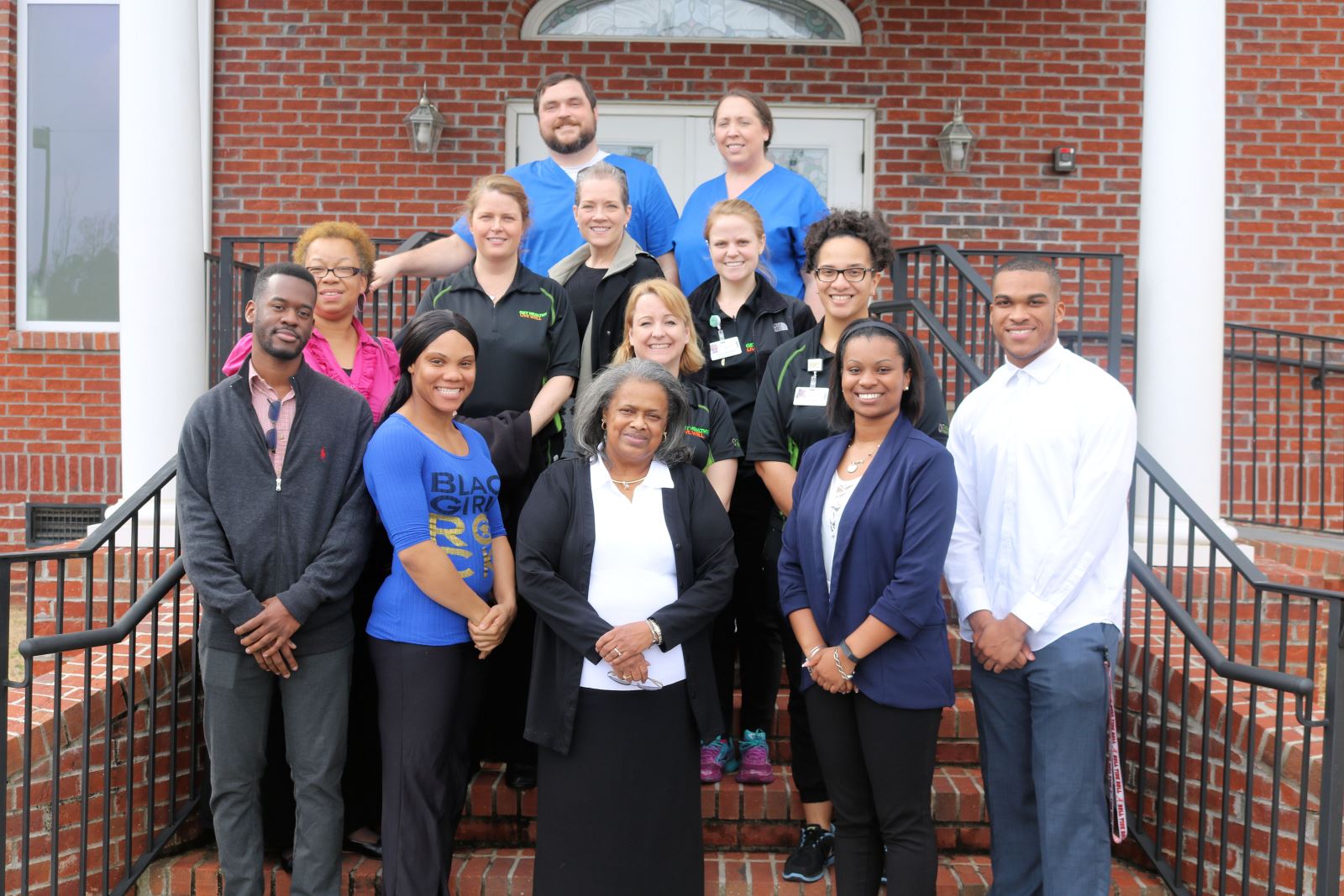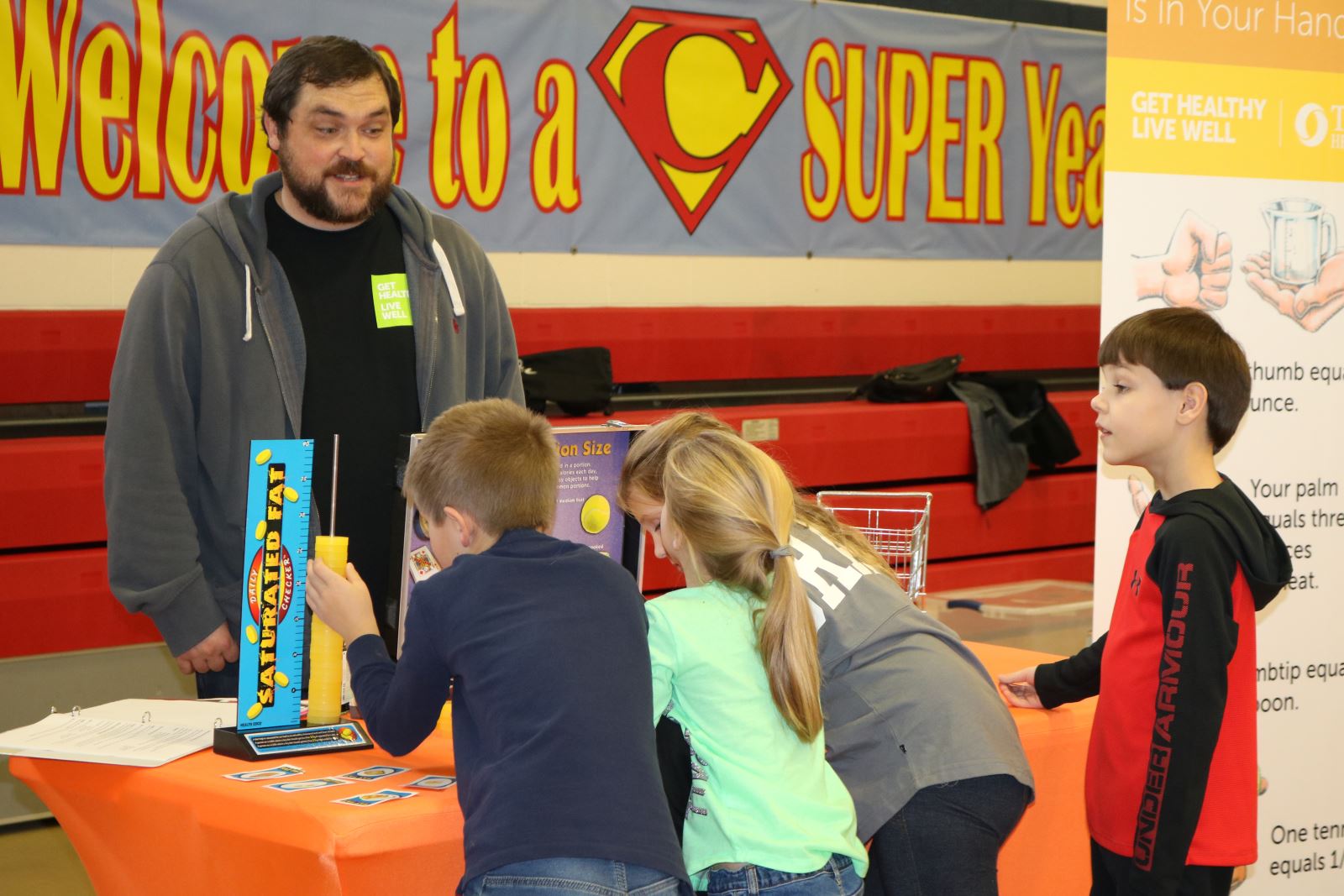Before Eric Brandenburg of Carrollton decided to pursue a career in nursing, he had actually spent more than 10 years in marketing.
 But then the recession hit and it became difficult to support his family.
But then the recession hit and it became difficult to support his family.
“My wife and I discussed the possibility of going back to school,” Brandenburg said. “But I had no idea what I wanted to study and what I wanted to do for the rest of my life.”
A couple of years later, his wife, Jamie, started nursing school.
“Once she started her clinical rotation, I could sense a change in her,” Brandenburg said. “She genuinely loves people and enjoys helping people whenever and wherever she can. She seemed so happy and fulfilled.”
He loved hearing her talk about the things she had done during her hands-on clinical training and how excited she was about her future as a nurse.
“Her dedication to her craft and the joy she found in helping others was so inspiring,” Brandenburg said.
At the time, he knew nothing about nursing — besides that nursing school was challenging, both technically and emotionally. He worried that he wouldn’t make it.
“But I knew I had to try,” Brandenburg said. “I knew I wanted to help people.”
Brandenburg applied for University of West Georgia’s Tanner Health System School of Nursing and got accepted. As a nursing student, he immersed himself in community health work as a volunteer for Tanner Health System’s Get Healthy, Live Well — a community health collaborative working to promote a healthy lifestyle and prevent chronic disease for residents in Carroll, Haralson and Heard counties.
Brandenburg’s first experience as a volunteer was at a health event at Antioch Missionary Baptist Church in Carrollton. The event was part of Get Healthy, Live Well’s Faith in Health initiative, which helps the faith-based community improve the health of their congregations.
“The members of the church were so eager to learn and improve their health,” Brandenburg said. “It was so incredible to see so many people becoming empowered to take control of their health. At that moment, public health became my passion.”
As a volunteer, he would check people’s blood pressures, blood sugar levels and cholesterol levels.
“After conducting assessments, I would talk to the people about their numbers, explaining what the numbers mean and how they can make improvements,” Brandenburg said. “Nutrition was a big part of our work with the churches.”
He assisted Get Healthy, Live Well with its “Go for 5 Fruit and Veggie Challenge” events, speaking to church members about nutrition and handing out free fruits and vegetables. He was also active with Get Healthy, Live Well youth programs, including the Kids Exhibit and Safe Sitter.
 When Brandenburg started working in the community, he was surprised by how great the need was for health education and preventive health strategies.
When Brandenburg started working in the community, he was surprised by how great the need was for health education and preventive health strategies.
“The sad fact is that so many people in this country suffer health disparities due to income, race, education level or age,” he said. “Many of these disparities are due to a lack of resources and a lack of health education.”
The more he saw, the more interested he became, recognizing the opportunity he had to make a difference in the community.
When he learned that Get Healthy, Live Well and UWG’s Tanner Health System School of Nursing were starting a new program in 2016 to connect senior nursing students to a variety of community health opportunities in west Georgia, he was thrilled. His nursing class was only the second to go through the program in January 2017.
“So many nursing students go through school without ever having experienced community health,” Brandenburg said. “This is really sad, because until you’ve seen health disparities first-hand, it’s hard to truly understand the needs that some patients have.”
He believes the experience gained from working with the community will make nursing students better nurses in the future. During the preceptorship program, he learned that there was a tremendous need for community health workers and funding programs. The preceptorship showed him that a health disparity isn’t just something they read about in a textbook.
“It is real and it exists in our own community,” Brandenburg said. “As grim as that sounds, I also learned there is a lot that can be done, and there are some really great people working and volunteering in our community to make a difference.”
He also learned the value of preventive health care and health education.
“We place so much emphasis on treating chronic diseases, such as heart disease and diabetes; however, we fall short when it comes to preventing these diseases,” Brandenburg said.
Perhaps, the most important thing he learned is not to be quick to judge people. For example, it’s easy to look at someone and say, “Maybe you could control your diabetes if you would just stop eating fast food all the time.” But Brandenburg pointed out that we don’t always know the whole story.
“Not everyone has access to resources that allow them to eat healthily,” he said. “I’ve learned that there are barriers to prevent some people from living healthy lifestyles.”
Some of these barriers include lack of transportation, lack of a safe place to exercise and lack of access to fresh fruits and vegetables.
“I believe this program has made me a better nurse because I am prepared to recognize these barriers and help provide my patients with resources to help them take control and be healthy,” Brandenburg said.
In January 2018, another 70 nursing students began the preceptorship program.
Nursing students who attended a Jan. 19 orientation learned more about Get Healthy, Live Well and practiced skills that will help them communicate better with patients.
 “As a volunteer and nursing student, Eric has made a tremendous impact in helping improve the community’s health,” said Phyllis Head, community outreach coordinator at Get Healthy, Live Well. “We hope this preceptorship program will continue to inspire even more nursing students to do the same.”
“As a volunteer and nursing student, Eric has made a tremendous impact in helping improve the community’s health,” said Phyllis Head, community outreach coordinator at Get Healthy, Live Well. “We hope this preceptorship program will continue to inspire even more nursing students to do the same.”
Amy Farmer, RN, MSN, FNP-BC, director of UWG’s bachelor of science in nursing program and a clinical associate professor, said her department is grateful for the opportunity to partner with Get Healthy, Live Well.
“The partnership between University of West Georgia’s Tanner Health System School of Nursing and Tanner’s Get Healthy, Live Well initiative has helped student nurses like Eric gain a more global understanding of the challenges of living a healthy lifestyle for different facets of the community,” said Farmer. “This understanding will help nurses empathize with patients, and assist in creating attainable health goals for individuals, which will eventually impact the health of entire communities. That is the whole point of nurses working in the community.”
Working with the churches will always be Brandenburg’s favorite activity with the program.
“I have connected with so many people and seen firsthand what a difference we can make,” Brandenburg said.
What he enjoyed most about being in the program was having the opportunity to follow up with the churches that he worked with the previous year as a volunteer and see the progress they had had made.
“Many of the people remembered me from the previous year,” Brandenburg said. “They were anxious to tell me the lifestyle changes they had made and how they had progressed toward their goals.”
Now serving as a registered nurse in the emergency department at Tanner Medical Center/Villa Rica, Brandenburg continues to help out with church health events when he’s able. He also uses his community health experience to talk to patients about prevention, helping them find resources that will enable them make healthy lifestyle changes. At times, he refers patients to Get Healthy, Live Well’s free, evidence-based wellness programs, including Freshstart, a tobacco cessation program, the Diabetes Prevention Program and Living Well With Diabetes.
“I am grateful for the opportunities I have had to work in the community,” Brandenburg said. “The preceptorship program brings future nurses closer to the community and teaches valuable lessons that will make them better able to understand and care for their patients.”
For more information on Tanner’s Get Healthy, Live Well, visit www.GetHealthyLiveWell.org.